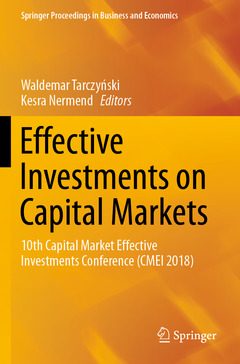Description
Effective Investments on Capital Markets, 1st ed. 2019
10th Capital Market Effective Investments Conference (CMEI 2018)
Springer Proceedings in Business and Economics Series
Language: English
Subjects for Effective Investments on Capital Markets:
Publication date: 08-2020
Support: Print on demand
Publication date: 07-2019
Support: Print on demand
Description
/li>Contents
/li>Biography
/li>Comment
/li>
This proceedings volume presents current research and innovative solutions into capital markets, particularly in Poland. Featuring contributions presented at the 10th Capital Market Effective Investments (CMEI 2018) conference held in Mi?dzyzdroje, Poland, this book explores the future of capital markets in Poland as well as comparing it with the capital markets of other developed regions around the world.
Divided into four parts, the enclosed papers provide a background into the theoretical foundations of capital market investments, explores different approaches?both classical and contemporary?to investment decision making, analyzes the behaviors of investors using experimental economics and behavioral finance, and explores practical issues related to financial market investments, including real case studies. In addition, each part of the book begins with an introductory chapter written by thematic editors that provides an outline of the subject area and a summary of the papers presented.
Kesra Nermend is Professor at the University of Szczecin, President of Center of Knowledge and Technology Transfer at University of Szczecin, and Head of the Department of Computational Methods in Experimental Economics in Institute of IT in Management in The Faculty of Economics and Management of the University of Szczecin (Poland). He has authored and co-authored about 100 publications mainly in the area of using quantitative methods and tools for the analysis of economic phenomena. Prof. Nermend is also Chair of Organization Committees and member of Programme Committees of scientific conferences; member of Polish Information Processing Society, West-Pomeranian branch; member of Scientific Society of Organization and Management, West-Pomeranian branch; member of Polish Association for Knowledge Management; member of Section of Classification and Data Analysis at Polish Statistical Association and West Pomeranian Information Society Council.
Explore the past, present and future of capital markets in Poland
Compares the Polish capital market to those in developed countries
Explores different approaches (both classical and contemporary) to investment decision making
Analyzes the behaviors of investors using experimental economics and behavioral finance
Features case studies from practitioners
Features contributions presented at the 10th Capital Market Effective Investments (CMEI 2018) conference




